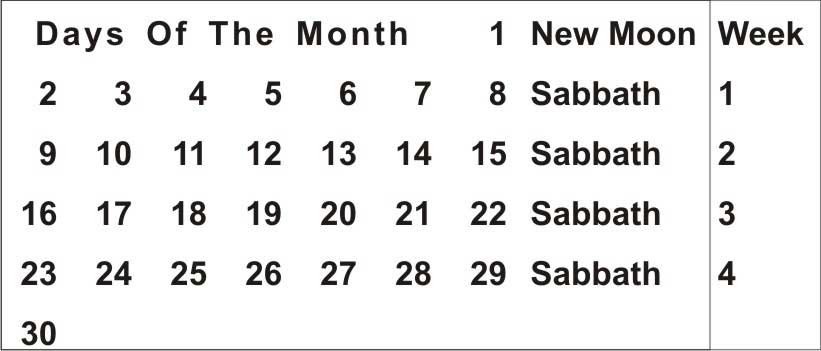
BY PROSPER TINGINI
The Lord our God established His clock and calendar at creation. That reference is found in the very first chapter of our biblical scriptures which talks about the creations of the days and nights as a pointer to the calendar. Genesis 1:3 reads: And God said, “Let there be light” and there was light. And God saw that the light was good; and God separated the light from the darkness. God called the light Day, and the darkness he called Night. And there was evening and there was morning, representing one day.
The Lord proceeded to create other measures for our planetary calendar. Genesis 1:14 refers; “And God said, “Let there be lights in the firmament of the heavens to separate the day and the night; and let them be for signs and for seasons and for days and years.” Indeed not only is there mention of days but of seasons and of years. The seasons in this reference were meant to signal some kinds of appointed festivals in our scriptures He would tell us of the festive gatherings to represent His anointed seasons. These proclaimed seasons are mentioned in full in Leviticus 23. In short, some of these are the Passover, Feast of Unleavened bread, First Fruits, Pentecost, Feast of Trumpets, Day of Atonement, Feast of Tabernacles (camp meetings) and others specified in other sections of our biblical scriptures.
A very important component of God’s calendar was that of every seventh day portion of the moon months as referenced at creation after God had worked continuously for six days. After completion of His creations, our scriptures read; Thus the heavens and the earth were finished, and all the host of them. And on the seventh day God finished his work which He had done, and he rested on the seventh day from all His work which He had done. So God blessed the seventh day and made it holy, because on it God rested from all His work which He had done in creation. This was indeed the creation of the weeks on His calendar as an additional permanent feature. In today’s terminology, this seventh day is known as the Sabbath Day.
People should be made aware of one distinct thing of note with regards to the days of Sabbath within a given moon month. God said that for it to be referred to as a full day, there has to be a combined completion of the light portion and the darkness portion of His creation of Day and Night. This sun day and moon night circle would end on the second day. The first day of the first week of month is the second day, which is mathematically correct as it means the first Sabbath of the moon circle would fall on the 8th day of beginning of the month i.e. 8-1=7. Therefore the next Sabbath days would be 15(8+7), 22(15+7), 29(22+7). As such it would imply that our monthly Sabbath circle should end on the 29th of every given month if we use God’s ordained moon and sun calendar. However, there is a day of every month without a moon.
The biggest difference between God’s calendar and the calendars in use today is how the weeks cycle through the year. The Gregorian calendar, like the Julian calendar before it, has a continuous cycle of unending weeks, one after the other. God’s calendar does not. The weekly cycle of any given month started with the appearance of each new moon.
Anciently, the Jews who followed God’s calendar waited to observe the first crescent of the moon and the day following that sighting (day two) was New Moon day. If no moon appeared either day or night after the end of its seen circle, then it was regarded as the rebuilding of the new moon. If the moon crescent was seen in the western sky in the evening following the 29th day of the month (fourth monthly Sabbath), a new month thus begun. If not, another day was added so that the particular month had 30 days. A month never had more than 30 days. The new moon is not part of the week, but of the month. Once a month they would have what we would term today as a “long weekend”, and in a 29-day month the fourth and last Sabbath would be followed by a New Moon day which would be an added to the first six days. The new moon days are mentioned in several chapters and verses of our scriptures but are separated from the Sabbath and work days (read Isaiah 66:23, Amos 8-5 and Kings 4:23).
When Emperor Constantine, who was of pagan roots, became a Christian, the official state religion became Christianity, rather than paganism. The pagans however kept all their forms of religion, their idols and their festivals. The only difference was that these idols and festivals were then given Christian names within the Christianity. The consequence was the outlaw of the Luni-Solar calendar used for generations by the faithful followers of God. Emperor Constantine, at the Council of Micaea in 321AD, changed both paganism and Christianity by combining them into a new organ. God’s original calendar was thus forcibly eliminated and the pagan Julian calendar with its continuous cycle of weeks was exalted and by both the Church and the State. The darkness of ignorance began to enshroud the world. The law then made it illegal to use the Biblical Luni-Solar calendar.
- Chamisa under fire over US$120K donation
- Mavhunga puts DeMbare into Chibuku quarterfinals
- Pension funds bet on Cabora Bassa oilfields
- Councils defy govt fire tender directive
Keep Reading
The Gregorian calendar is what is being used today. It is a solar calendar based on how long it takes the earth to resolve around the sun. The solar year is 365,2422 days long, hence the need for the leap years every four years. The Lunar calendars are based on the cycles of the moon, which are 11 days shorter than the solar year. As a result, the dates of the Lunar calendar float through the solar year. The Luni-Solar calendars are a combination of the two. The days are marked off by the rising of the sun while the months are tied to the cycles of the moon. It does not shift as much as a strictly lunar calendar, so spring religious feasts remain in the spring, while fall religious feasts remain in the fall.
Graphically, the biblical calendar would look like below:
![]()
Prosper Tingini is the Scribe of the Children of God Missionary Assembly – God’s messengers. Contact details: Mobile and whatsapp – 0771 260 195. Email address: [email protected]











